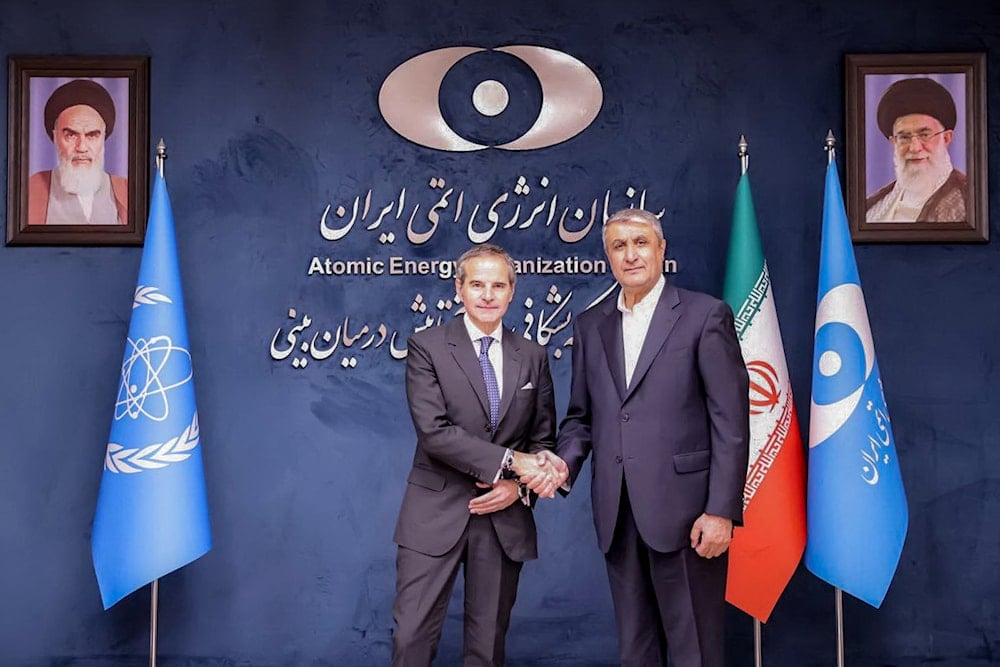IAEA should be involved in Iran-US nuclear talks, chief says in Tehran
Rafael Grossi says he had discussed with the head of Iran’s Atomic Energy Organization how the IAEA could support the ongoing talks between Tehran and Washington.
-
 This handout picture made available by the Iranian Atomic Organization (IAEO) office shows the Director-General of the International Atomic Energy Agency (IAEA), Rafael Grossi (L), being received by the head of the IAEO, Mohammad Eslami (R), in Tehran, on April 17, 2025 (Iranian Presidency / AFP)
This handout picture made available by the Iranian Atomic Organization (IAEO) office shows the Director-General of the International Atomic Energy Agency (IAEA), Rafael Grossi (L), being received by the head of the IAEO, Mohammad Eslami (R), in Tehran, on April 17, 2025 (Iranian Presidency / AFP)
The International Atomic Energy Agency (IAEA) seeks to play a role in the negotiations between Iran and the United States, the UN nuclear watchdog's chief said on Thursday.
Speaking at a press conference in Tehran on Thursday, Rafael Grossi said he had discussed with Mohammad Eslami, head of Iran’s Atomic Energy Organization, how the IAEA could support the ongoing talks between Tehran and Washington.
He acknowledged that the negotiation process is complex and pointed out that some parties are opposed to the talks producing results.
Nevertheless, Grossi stressed the importance of continued efforts to achieve peace.
The IAEA chief emphasized that any potential agreement between Iran and the US must be credible, something that would require IAEA verification.
He reiterated the agency’s intention to be involved in the dialogue, saying it is essential to understand Iran’s expectations.
Grossi added that he is also "in contact with the American negotiator to see how the agency can be a bridge between Iran and the US, and help achieve a positive outcome in the negotiations."
Time running out for Iran, US to reach deal, Grossi says
Grossi warned that time is running out for Iran and the US to reach a deal, as the two sides prepare for a new round of nuclear negotiations this weekend.
Delegations from both countries are scheduled to meet in Rome on Saturday for a second round of talks mediated by Oman.
The meeting comes a week after Iran and the US held their highest-level discussions since President Donald Trump withdrew from the 2015 nuclear agreement in 2018.
"We are in a very crucial stage of these important negotiations. We know we don't have much time, this is why I am here ... to facilitate this process," Grossi said during a visit to Tehran.
"We are working hard and we want to succeed," he added at a joint press conference with Eslami, acknowledging the difficulty of reaching an agreement.
On Wednesday, Grossi met with Iranian Foreign Minister Abbas Araghchi, who had led the first round of talks with US Special Envoy Steve Witkoff the previous weekend.
Araghchi described his meeting with Grossi as “useful,” and emphasized that the IAEA could play a "crucial role" in the peaceful resolution of the Iranian nuclear file in the coming months.
He also urged the IAEA to remain impartial and “keep the agency away from politics,” warning of "spoliers" attempting to derail the negotiations.
Grossi claims Iran ‘not far’ from nuclear bomb
In comments to Le Monde before arriving in Tehran, Grossi claimed that Iran was “not far” from possessing a nuclear bomb.
Western nations have long accused Iran of seeking to develop nuclear weapons—an allegation Tehran has repeatedly denied.
After Trump exited the 2015 accord, Iran began rolling back its commitments under the deal, which had granted sanctions relief in exchange for strict limits on its nuclear program monitored by the IAEA.
According to the agency’s latest report, Iran currently possesses approximately 274.8 kilograms (605 pounds) of uranium enriched up to 60%—a level far above the 3.67% cap set by the 2015 agreement, though still below the 90% required for a nuclear weapon.
Since returning to office in January, Trump has reimposed his “maximum pressure” sanctions policy on Iran. In March, he sent a letter to Iranian Leader Sayyed Ali Khamenei proposing talks and warning of potential military action should Tehran refuse.
The New York Times reported Thursday that Trump had recently blocked an Israeli plan to strike Iranian nuclear sites, opting instead to pursue a negotiated agreement.
'Contradictory and conflicting positions'
The leader of the Islamic Revolution and the Islamic Republic of Iran, Sayyed Khamenei, said Tuesday that although initial talks with the US had started well, there was no guarantee of success. “The negotiations may or may not yield results,” he indicated.
On Wednesday, Araghchi pushed back against a call from Witkoff to halt uranium enrichment, insisting the issue was not up for negotiation. Witkoff had previously urged Iran to return to the 3.67% enrichment ceiling set by the 2015 deal.
Araghchi expressed hope that a framework for a potential agreement could soon be discussed but warned that progress depended on "constructive positions" from Washington.
"If we continue to (hear) contradictory and conflicting positions, we are going to have problems," he cautioned.
On Thursday, Araghchi arrived in Moscow on a “pre-planned” visit. “Our regular exchanges with Russia and China have allowed us to align our positions,” he said upon arrival.
Meanwhile, Saudi Arabia’s official press agency reported that Defense Minister Prince Khaled bin Salman had also traveled to Tehran on Thursday for talks.
Read more: Trump bars IOF strike, Grossi sharpens Iran tone; coincidence or plan?

 5 Min Read
5 Min Read










